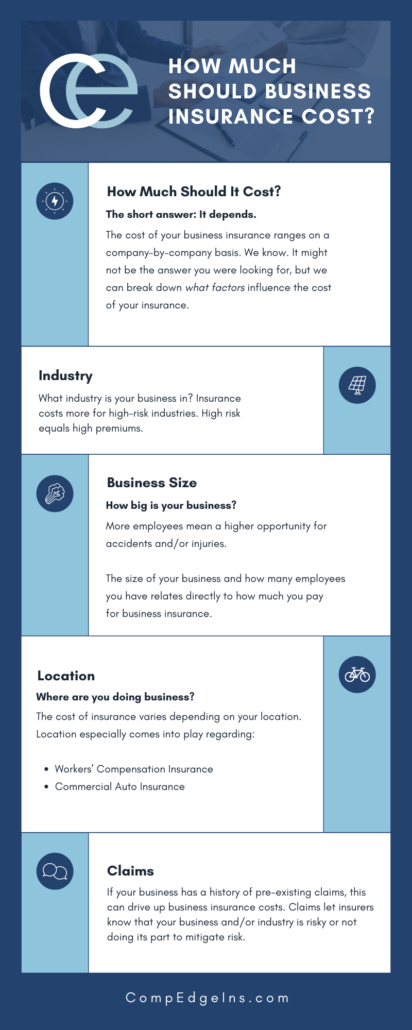How Much Should Business Insurance Cost?
As a business owner, it’s crucial that you know all of your expenses upfront. One of these expenses includes your business’s insurance. As a business owner, how much cash should you prepare to put toward protecting your business? More specifically, how much should business insurance cost? Let’s discuss.
Why Do I Need Insurance?
Insurance is a necessity for all businesses, especially small businesses. But why? Well, the fact of the matter is that accidents happen. As The Hartford puts it, “business insurance helps pay for damages you’d otherwise have to cover out-of-pocket.”
In addition to protecting your business and providing benefits to employees, having business insurance helps reduce stress while saving time and money.
There are many types of insurance to consider as well, including:
- General Liability Insurance
- Workers’ Compensation Insurance
- Cyber Liability Insurance
- Commercial Property Insurance
- Business Income Insurance
- And more
The types of insurance that you must have vary on a state-by-state basis.
Below is what Competitive Edge Insurance founder, Brenda Jo Robyn, considers as “must-haves.”

Insurance ‘Must-Haves’
Employment Practices Liability Insurance (EPLI)
Employers must have Employment Practices Liability Insurance (EPLI). Did you know that non-litigated vs. litigated cases can rack up over $500,000 in costs? EPLI insurance typically pays for litigation if you ever went to court with one of your employees.
General Liability
If you work with cities, federal governments, and/or government agencies, general liability insurance is required for your contracts. It is also required if you are operating a franchise. If you have a lease, it is also typically required by the property owner.
General liability insurance is typically more contractually required rather than on a federal level.
Commercial Auto Policy
Car accidents are not cheap by any means. In fact, did you know that car accident claims can be as high as $75,000?
If employees are using cars to do their job, a commercial auto policy is necessary. (Yes, this includes tasks as simple as running to the post office!)
If they’re using their own car they also need that coverage.
As a business owner, be sure to set up policies and procedures to check employees’ insurance. Remember, when necessary, employee insurance kicks in first. Your business’s commercial auto policy would kick in on top of that.
Workers’ Compensation Insurance
ALL California employers are required to provide workers’ comp for all employees. This means whether they’re in the office, out in the field, or in their homes working, workers’ compensation must be provided.
In the case of hiring an independent contractor, Brenda Jo recommends always requiring any 1099 workers to have their own workers’ compensation insurance.
This way, if they are injured on the job, they’ll have their own coverage.
How Much Should Business Insurance Cost?
As a business owner, how much should you be spending on business insurance? The cost of your business insurance ranges on a company-by-company basis. The price of insurance depends on the size as well as the nature of a business.
So the short answer is, it depends.
We know. It might not necessarily be the answer you were looking for; however, we can break down what factors influence the cost of your insurance.
Insurance Costs: Factors to Consider
As a general rule of thumb, your business’s insurance costs can cost between 10-30% of your predicted gross sales. However, this is not a hard and fast rule.
Below we’ve listed some factors that influence the costs of your business insurance.
Industry
First things first, what industry is your business in? Simply put, insurance costs more for high-risk industries. High risk equals high premiums.
For example, it would cost more for a construction company to receive the same insurance coverage as a marketing firm.
High-risk insurance addresses companies whose coverage was either terminated because of a claim, those who are new and cannot get coverage because of industry risk, or those who have experienced drops in revenue or industry disruption such that carriers are broadly refusing coverage.
These high-risk areas include:
- Construction
- Health and Wellness
- Cyber Liability Risk
- Bonding
- General Liability
- Workers’ Compensation
- Cannabis
- And more
Business Size
How big is your business? Business insurance for a small company, compared to a large company will, of course, be less expensive. More employees mean a higher opportunity for accidents and/or injuries.
The size of your business and how many employees you have directly relates to how much you pay for business insurance.
Location
Where are you doing business? The cost of insurance varies depending on your location. Location especially comes into play with regards to:
- Workers’ Compensation Insurance
- Commercial Auto Insurance
Claims
If your business has a history of pre-existing claims, this can drive up your business insurance costs. Claims let insurers know that your business and/or industry is risky or even worse, that your business is not doing its part to mitigate risk.
Sales
Insurers look at your sales to determine the cost of your general liability insurance. The reason is that the more clients or customers that you have, the higher chances that someone will be injured or upset in some manner.
Coverage and Deductibles
A final element to consider is under what circumstances your policy will payout and how much they will pay. This affects overall business insurance costs.
To note, lower deductible equaled increased costs in your business insurance policy.
Here to Help
Business insurance will vary in price from one insurer to the next depending on the factors we’ve listed above. At Competitive Edge, we specialize in insuring high-risk businesses. We build your case to the carrier to ensure that you get the right coverage at the best price based on your real-world conditions.
To learn more about how to protect your business, read our blog post ‘What is Risk Mitigation?’



